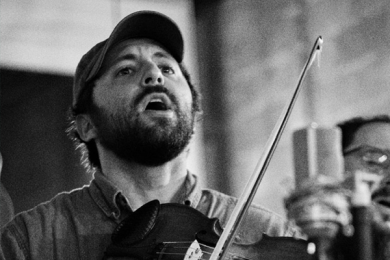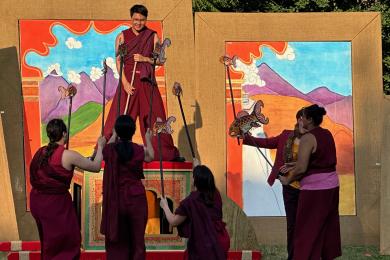We listen to Michael Kaiser so you don't have to -- though you should.
News
I generally rebel against authority and approach all successful people with skepticism. Rather than a pathology, this seems only logical to me. The world is a messed-up place; if you’re in a position of authority in it, you must be responsible, somewhat complicit, or messed-up yourself.
I also generally hate colloquy, conversations, or forums. As my father once said about, I think, education classes for working teachers, they can be generally characterized as – “Diatribes in the obvious.”
As an adult, though, I’m more and more reminded that there are people in authority who are trying to clean up the mess.
So, after Tuesday morning’s “Conversation with Michael Kaiser” at the Ordway, I’ve got to admit that this is a guy worth listening to. If you didn’t get a chance to see him, allow me to give you an entirely subjective recounting of some of what he said.
First of all, let’s just stop and contemplate the fact that Michael Kaiser, who is currently President of the Kennedy Center, saved the Royal Opera House in London from a $30 million dollar deficit. That’s 3 with SEVEN zeros and TWO commas behind it. I doubt I will ever be near $30 million dollars let alone owe it to someone else. $30 million is more than the Big G’s annual budget by 5 or 6 million! If you’re not impressed –if you think he could save them with smoke and mirrors and bullshit instead of real innovative hard work – then you’re crazy.
Second, Mr. Kaiser himself acknowledges that maybe what he was saying in this “community conversation” and what he articulates in his book The Art of the Turnaround is obvious. (He used the term “common sense.”) I give him points for that.
But most of all I give him extra points for articulating these “obvious” things in a way that felt integrated and prioritized appropriately. Sometimes, the end points aren’t hard to come by; the difficult part is not losing sight of the purpose of the journey and the necessary stops along the way.
1. Kaiser repeatedly emphasized the importance of the arts programming over all other aspects of the operation. So often when I hear about discussions of the “arts in crisis,” I’m disappointed to discovery that it isn’t a discussion of the arts in crisis, it’s a discussion of arts management in crisis. While this event was also an arts management event, Kaiser did his very best to remind the audience that the art is the most important thing. He used the phrase “creating exciting work” or “really exciting programming” over and over again, and then again. In his mind, this is the only way to save the arts – rather than cutting back, retreating, producing “more accessible” shows, etc. “Really exciting programming” will drive excitement and energy and engagement which will in turn make marketing and fundraising and more exciting work possible.
2. He was exceptional at articulating the challenges and strengths of arts communities. For those of you, even in the arts world, who still need to understand why the arts need for grants and subsidies is not a reflection of the relevance of the arts, he began his chat with a quick summary. (I include it here because I still hear even actors and such talking about “letting the market decide.”) Basically, for most performing arts organization, there are no ways to increase productivity. While the rest of the growth in the U.S. economy is based on squeezing more productivity out of workers at the same cost, the arts cannot increase the speed of a Beethoven symphony or decrease the cast size of a classic play. Therefore, costs rise much faster than inflation while earned revenue remains the same – because every year you can only fit the same number of people into the seats at your theater. These are structural facts that have nothing to do with whether or not the performing arts are relevant, valuable, or valued in the world today.
It’s what’s called a market failure – not an artistic one.
He also pointed out that in down times like this one, the arts organizations that may disappear aren’t necessarily the ones who produced weak art but the ones who have weak managers. As I did throughout his discussion, I was impressed by the way he was able to distinguish between the art and arts management, and prioritize them appropriately.
3. It was a two hour discussion, and there was a lot worth hearing in it. If you’re an arts manager, or a curious artist, you should buy his book The Art of the Turnaround or sign up for the the online forum he created.
But the final point that I feel worth mentioning here had to do with advanced planning. Kaiser recommended that organizations plan out 3-5 years in advance – and that they plan to be ambitious. He suggested that this can help build trust between the artistic director and managing or executive director. Instead of saying “no” all the time, the administrator gets to say, “Yes! In the middle of our five year plan! Yes!” It also makes it easier to organize and fund for these ambitious events when you have a lot of time to do it. And, finally, it provides more time to get the community of funders and audiences excited about what’s about to happen.
This is one of those “obvious” things that only feels obvious after you hear it.
Now someone just needs to hold a community conversation about what precisely we mean when we say “really exciting programming.”


